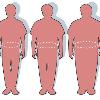

- » One in 10 adults in danger from obesity
- » Insulin sensitivity may explain obesity, memory problems link
- » US adults still don't eat enough vegggies, and diets are largely fruitless, CDC study shows
- » First lady Michelle Obama visits French Quarter for NFL exercise clinic for children
- » Weight loss surgeries in England rose tenfold from 2000-2008, experts worry trend may continue
- » Research finds belly bulge can be deadly for older adults, even those whose weight is 'normal'
- » Overeating for 2 could create a baby more likely to be obese and have later health problems
- » Michelle Obama on health: she beats up on beets, likes dietary cleanses, makes kids try tennis
- » Obesity rates: Gap closing between what Americans say they weigh and what measurements show
- » Low-carb diet better at boosting 'good' cholesterol than low-fat; weight loss same, study says
Topics: Health Tags: Obesity View |
Topics: Health Tags: Obesity View |
Topics: Health Tags: Obesity View |
|||||||||
Topics: Health Tags: Obesity View |
Topics: Health Tags: Obesity View |
Topics: Science and Technology Tags: Obesity View |
|||||||||
Topics: Health Tags: Obesity View |
Topics: Health Tags: Obesity View |
Topics: Health Tags: Obesity View |
|||||||||
Topics: Health Tags: Obesity View |
Topics: Health Tags: Obesity View |
simplify further Tags: Obesity View |
|||||||||
Topics: Health Tags: Obesity View |
Topics: Health Tags: Obesity View |
Obesity is a medical condition in which excess body fat has accumulated to the extent that it may have an adverse effect on health, leading to reduced life expectancy and/or increased health problems. Body mass index (BMI), a measurement which compares weight (Human weight) and height, defines people as overweight (pre-obese) (overweight) when their BMI is between 25 kg/m2 and 30 kg/m2, and obese when it is greater than 30 kg/m2.
Obesity increases the likelihood of various diseases (Obesity associated morbidity), particularly heart disease (cardiovascular diseases), type 2 diabetes (diabetes mellitus type 2), breathing difficulties during sleep (obstructive sleep apnea), certain types of cancer, and osteoarthritis. Obesity is most commonly caused by a combination of excessive dietary calories (Food energy), lack of physical activity, and genetic susceptibility (Polygenic inheritance), although a few cases are caused solely by genes, endocrine disorders, medications or psychiatric illness. Evidence to support the view that some obese people eat little yet gain weight due to a slow metabolism is limited; on average obese people have a greater energy expenditure than their thin counterparts due to the energy required to maintain an increased body mass.
The primary treatment for obesity is dieting and physical exercise. To supplement this, or in case of failure, anti-obesity drugs may be taken to reduce appetite or inhibit fat absorption. In severe cases, surgery (bariatric surgery) is performed or an intragastric balloon is placed to reduce stomach volume and/or bowel length, leading to earlier satiation and reduced ability to absorb nutrients from food.
Obesity is a leading preventable cause of death (preventable causes of death) worldwide, with increasing prevalence in adults and children (childhood obesity), and authorities view it as one of the most serious public health problems of the 21st century. Obesity is stigmatized (Social stigma) in the modern Western world, though it has been perceived as a symbol of wealth and fertility at other times in history, and still is in many parts of Africa.
Diseasesdb: 9099
Icd10: ICD10E66 e65
Icd9: ICD9278
Medlineplus: 003101
Omim: 601665
Emedicinesubj: med
Emedicinetopic: 1653
Meshname: Obesity
Number on List: C23.888.144.699.500














